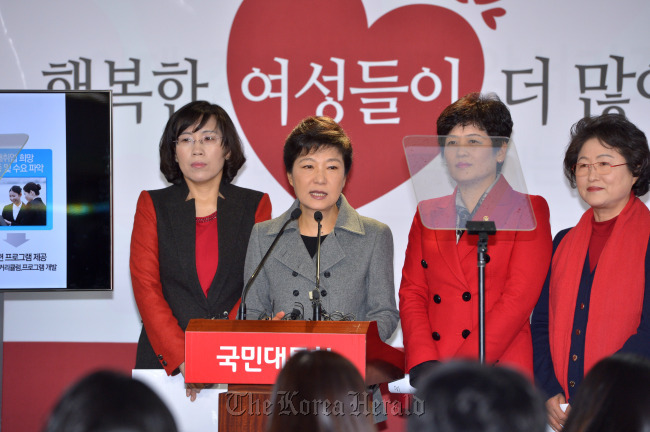박근혜 대통령 당선인이 복지정책 공약에서 가장 강조해 온 것은 '확실한 국가책임 보육'과 '생애주기별 맞춤형 복지'다.
박 당선인의 공약은 대체로 '맞춤형 복지'를 통한 선별적 취약계층 지원에 초점 이 맞춰져 있으나 기초노령연금과 5세 이하 아동 무상보육은 전 계층에 대해 실시하겠다는 뜻을 밝히는 등 보편적 복지의 색채도 있다.
 |
박근혜 대통령 당선인 (박현구/코리아헤럴드) |
Park’s life cycle health, welfare system put to test
Pledges include full support for patients with four major diseases, differentiated health insurance coverage according to income level
President-elect Park Geun-hye used to say that her foremost task is to bring stability to people’s lives if she becomes the nation’s first female president.
Projecting her image of a guardian of the state and of the people, Park pledged to introduce a Korean version of a lifecycle health and welfare system with programs tailored to all age groups from newborns to senior citizens.
Park’s plans seek to ensure that people can secure jobs and a stable income throughout all stages of life. In this regard, she vowed to increase the proportion of the middle class to 70 percent.
Starting with free child-care services for children under 5 and child subsidies for families with toddlers under age 2, the new administration will offer free education for high-school students, regardless of income level.
She is likely to expand health care for the elderly and introduce one month’s paid paternity leave, so fathers can help take care of their newborn babies. Pregnant workers may have reduced office hours and low-income families will get state support packages for their newborn babies from diapers and powdered milk to tax exemptions. Free college tuition will also be offered to a third child of a family.
When looking into details, one may find her welfare plans are more about lifting the socially underprivileged out of poverty, rather than offering the same level of welfare plans for all.
Full medical support for patients with four major diseases ― cancer, cerebrovascular and cardiac disorders, and terminal illness ― is one highlight of her welfare pledges that well reflects her will to support those in urgent need first. Stressing examples of low-income families going bankrupt because of massive medical costs, Park said that the state should save their lives and offer a chance to stand on their own feet.
The new administration is likely to offer differentiated health insurance coverage according to taxpayers’ income level. Park plans to place a different level of cap on medical costs that need to be covered by the individuals. By dividing taxpayers into 10 groups within their income level, the group of lowest income earners would have to pay up to 500,000 won ($460) of medical costs a year while the highest income group would have a 5 million won ceiling on annual medical costs.
Support for seniors is also one of her priorities. The 60-year-old president-elect vowed to expand the state pension for the elderly and allow health insurance to cover dental implant surgery for senior citizens. By doing so, Park said she will improve health insurance coverage to 80 percent from current 62 percent, which critics say is impossible.
Critics cast doubts on her comprehensive welfare plans, saying they lack of feasibility and consistency. The president-elect will have to prove how those pledges are financially feasible and whether they are directed at those in need during the policymaking process, they said.
The president-elect said her government would generate 27 trillion won a year, or 135 trillion won over the next five years. To finance the budget, Park vowed to reduce inefficient government spending and expand tax revenue, particularly by taxing the currently informal sector.
She is also tasked with establishing a control tower to efficiently deliver programs and coordinate jobs among related ministries, and developing her welfare pledges into viable policies.
By Cho Chung-un (christory@heraldcorp.com)







